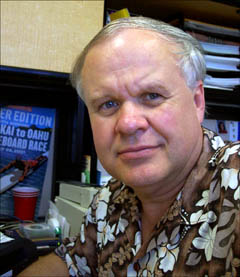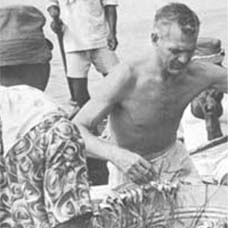
David Chesley Briscoe was allowed to return to the Philippines, where he was a co-editor of the Philippines national Peace Corps magazine. He also married Leonor Aureus, then an editor of The Bicol Mail, a newspaper in the Philippines.
A life in print
former Chronicle editor devotes his life to journalism
By Karen Hunt
Published: Wednesday, April 23, 2003
Article Tools:Email This ArticlePrint This Article Page 1 of 1
The '60s were a time of riots, rebellion and rivalry. David Chesley Briscoe was interested in what was going on, which is why he worked for The Daily Utah Chronicle his junior year at the U.
Briscoe later became political editor and finally associate editor for The Chronicle. He also worked at the Deseret News at the same time, first as a night clerk and later as a reporter.
"Actually, The Chronicle is what got me into journalism. I wasn't actually taking journalism classes before I got involved with The Chronicle," Briscoe said.
Briscoe has worked as a journalist for more than three decades. He was The Associated Press bureau chief in the Philippines and the AP chief international correspondent in Washington, D.C., during that time.
His friends and family say he is good natured and optimistic, and Briscoe expresses that optimism, in part, through a zest for learning.
Briscoe has spent a lifetime seeking knowledge. He tries to communicate a wider vision of the truth through his writing.
"I think that a journalist's prime and only responsibility is to report the truth...I guess success is to get as much of the truth and as close to the truth as possible," Briscoe said.
While still at the U, he left for the Peace Corps, which sent him to the Philippines during the Vietnam War. As a result, Briscoe never got the chance to finish his degree.
Briscoe didn't support the Vietnam War, and when he was called home from the Philippines to be drafted, he argued that he should be able to return to his service in the Philippines as a conscientious objector.
"He had to come here and meet with the board-he couldn't have a representative or anything-and tell them why he didn't want to go to war," said his mother, Norma Briscoe. "We just felt awful."
He was allowed to return to the Philippines, where he was a co-editor of the Philippines national Peace Corps magazine. He also married Leonor Aureus, then an editor of The Bicol Mail, a newspaper in the Philippines.
He said that because he married a Filipino, his family has a sense of cultural duality and they have tried to build a mutual sense of community between them.
"I sort of adopted another community. I think I have adopted some Filipino characteristics," said David Briscoe. "It's added quality to my life to be part Filipino."
David Briscoe has spent much of his life away from his place of birth, and he believes in the importance of doing the best you can with what you have, where you are.
He spent a year reporting on the Philippines for the AP, then returned to the United States to report on Salt Lake culture as an AP writer for nine years.
Bill Beecham, a former colleague and the current AP bureau chief in Salt Lake City, said Briscoe did everything at the AP, from filing wire to reporting.
"We worked many years together, and he's probably my best friend," said Beecham. "David's a very excellent reporter, excellent writer...He's been in the AP almost as long as I have, and that's a long time."
Briscoe and his family of six left Salt Lake City after he was offered the Filipino AP bureau chief position in 1980.
"I was offered the Philippine job because I had lived there for four years and probably knew the country better than any other American working for the AP at the time," he said.
There he watched first-hand a country in revolution. David Briscoe was on the front lines reporting on the last six years of President Ferdinand E. Marco's reign, the assassination of opposition leader Benigno Aquino, the People's Power Revolution and the election of President Corazon Aquino. Aquino, the widow of the murdered opposition leader, was Time magazine's person of the year in 1986. Her election broke the 20-year rule of dictator Marco.
"It was a time of massive demonstrations, communist rebellion, earthquakes and government repression affecting the news media," Briscoe said.
It was after a transfer from the Philippines to Washington, D.C., that he said he had the opportunity to report from the heart of American government.
"I don't exactly like being at the core of events," he said. "Journalists do tend to get caught up in events they're involved in. It's part of the danger of Washington."
He held many positions in Washington, including the chief international correspondent for the AP.
"It's a very inflated title for what it was," David Briscoe said.
Actually, he says he was writing hundreds of articles on what was happening in Washington. He was an international correspondent, writing about the United States for a foreign audience and his articles appeared in newspapers around the globe.
Although David Briscoe never graduated from college, his family developed a home in which their two children were encouraged to read, talk about politics over the dinner table and develop their creative gifts.
His mother's writing has been published in some local magazines and his father was president, secretary of treasury and an international representative for a labor union. His father was noted for his abilities as a negotiator and writer. And his brother, Roscoe Briscoe, said that while intellectual curiosity doesn't always guarantee success, it does make life much more interesting.
In April 2001, David Briscoe became the AP bureau chief in Honolulu. "I was tired of the in-breeding and high pressure of Washington," he said.
Raki Briscoe, David Briscoe's son, sees his father as passionately opinionated about life.
"I think most things are important to him, even if they are important because he disagrees with them, or does not approve...," Raki Briscoe said. "Maybe that's another thing that is important to him and part of why he likes being a journalist-to have a stance on things, to believe in things for reasons defined."
karenhunt@chronicle.utah.edu









